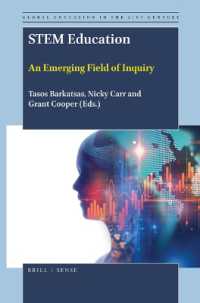Full Description
This volume aims to stimulate interest in the under-researched role of silent partners (SPs) in multicultural education. Silent partners include formal and informal places-spaces in schools (e.g. architecture, classroom facilities, libraries, corridors, playgrounds, canteens), objects (e.g. teaching aids, furniture, wall decorations and overall interior design), interactive technologies (use of devices and applications) but also often taken-for-granted and not immediately visible patterns of thought, ideologies and assumptions.
People involved in education all engage and work with a number of SPs that contribute to the delivery of curricula, but also to social life and well-being in and out of schools. The way places-spaces, objects and technologies influence the school community's experiences of learning, well-being and social justice is rarely observed and problematised in education - hence the adjective 'silent' in the term 'silent partners'.
Contents
Foreword: A Brief Consideration of Research as Situated Inquiry, Linda K. Thompson and Mark Robin Campbell.
Chapter 1. Straight, No Chaser: Talking About Race and Music Education, Adrienne Dixon.
Chapter 2. I'm Gonna Be a Rock Singer ... And People Gonna Love Me: Urban Preschool Students' Musical Experiences, Vanessa L. Bond.
Chapter 3. Music Teachers Investigate Their Work: Collaborative Inquiry as Curriculum Making and Professional Development, Melissa Natale-Abramo and Mark Robin Campbell.
Chapter 4. Amy's Leaving Story: A Narrative of Music Teacher Attrition, Tami J. Draves.
Chapter 5. Music Education and School Choice Reform: Music Programs in New York City Charter Schools, Kenneth Elpus.
Chapter 6. Function-Based Music Education: A Framework for Facilitating Musical Learning and Developing Human Relationships Through Analyses of Two Prison Case Studies, Maud Hickey and Mary L. Cohen.
Chapter 7. Music Education and Avocational Music Making: Examining Discourse Using Techniques From Corpus Linguistics, Roger Mantie.
Chapter 8. The Interplay of Composing, Developing Musicianship, and Technology: Complexities and Connections, Sandra Nelson.
Chapter 9. Motivation and Meaning Construction Among Members of Two Senior Adult Musical Ensembles, Samuel Tsugawa.
Chapter 10. Six Perspectives on Peer Review in Music Education Research: Introduction, Mark Robin Campbell and Linda K. Thompson.
Chapter 11. Peer Review, Susan Wharton Conkling.
Chapter 12. The Successful Peer Reviewer, William I. Bauer.
Chapter 13. Reflection on the Publication Process and Tips for Authors, Colleen Conway.
Chapter 14. Peer Review as Apprenticeship to the Academy, Peter Whiteman.
Chapter 15. Participating in the Peer Review Process in Music Education: An Early Career Perspective, Joshua A. Russell.
Chapter 16. Developing Expertise in Peer Review, Lisa Hunter.
About the Authors.








